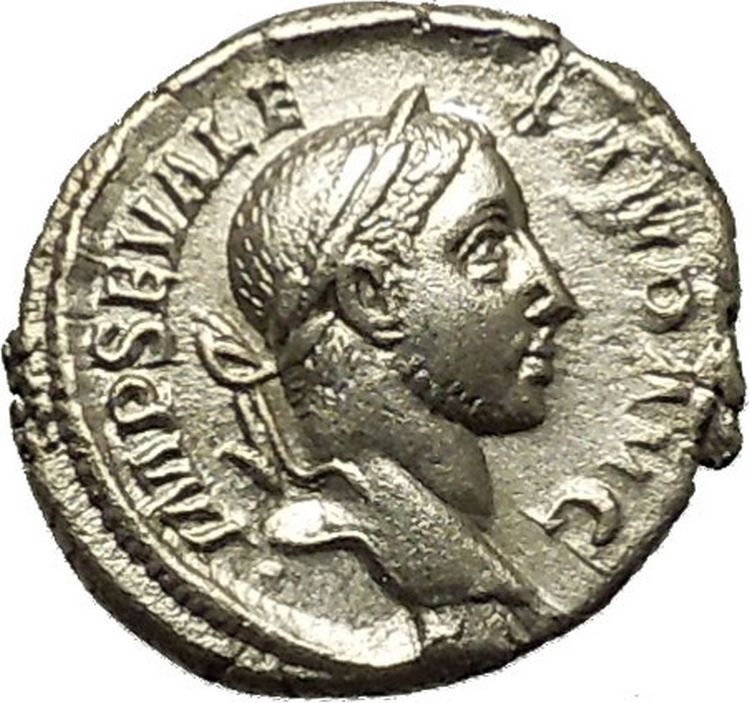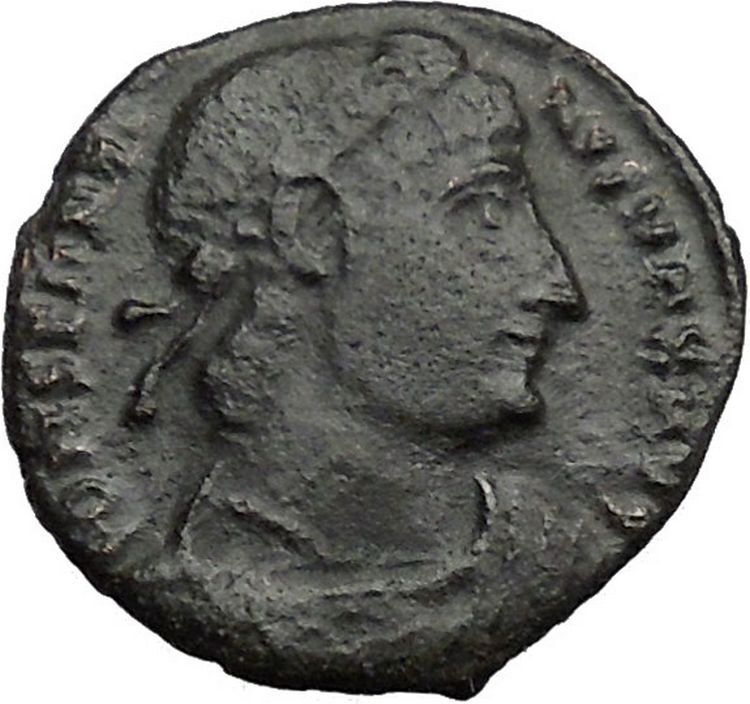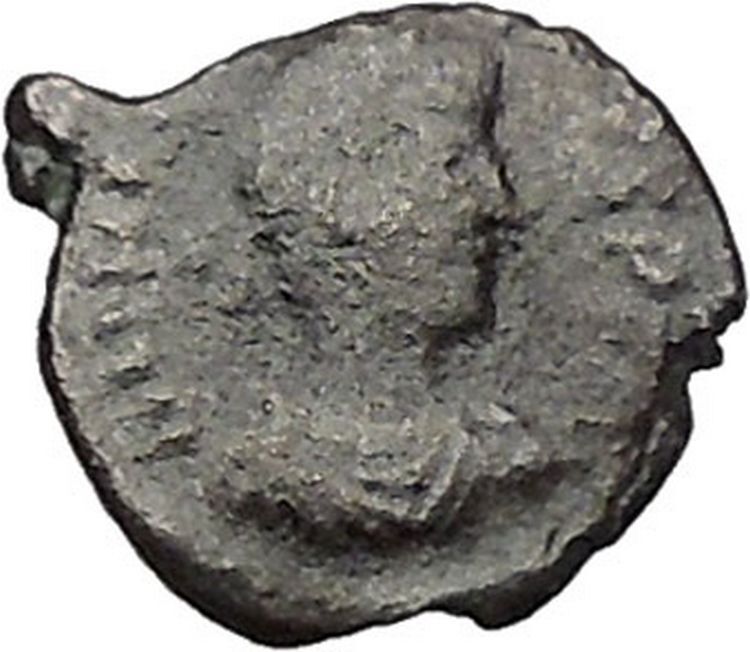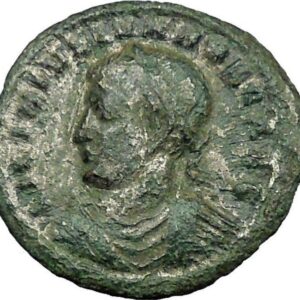|
Probus – Roman Emperor: 276-282
A.D.
Silvered
Bronze Antoninianus 23mm (4..06 grams) Siscia mint:
278-280 A.D.
Reference: RIC 657c, C 147
IMPPROBVSINVAVG – Radiate, draped and cuirassed bust
right.
INV – Invictus (unconquered)
CONCORDMILIT Exe: S/XXI – Probus standing right on left, shaking hands
with Concordia to right.
You
are bidding on the exact item pictured, provided with a
Certificate of Authenticity and Lifetime Guarantee of
Authenticity.
Invictus (unconquered) was an
epithet
used for various Roman divinities in the Roman Empire.
In the
Roman Calendar
of the early empire these include
Jupiter
Invictus and
Mars
Invictus. It was in use from the late Republic and
throughout the Imperial period for a range of deities,
such as
Hercules
,
Apollo
and
Silvanus
,
and was therefore a well-established form when applied
to
Mithras
by Roman devotees from the 2nd century onwards. It has a
clear association with solar deities and solar monism;
as such, it became the preferred epithet of Rome’s
traditional
Sol
and the novel, short-lived Roman state cult to
Elagabalus
,
an
Emesan
solar deity who headed Rome’s official pantheon under
his
namesake emperor
In
Roman religion
, Concord (Latin:
Concordia, “harmony”) was the
goddess of agreement, understanding, and marital harmony. Her Greek version is
Harmonia
, and the Harmonians and some
Discordians
equate her with
Aneris
. Her opposite is Discordia (or the Greek
Eris
).The
cult of Concordia
Augusta
(“Majestic Harmony”) was of special importance to the
imperial household
. Dedicatory inscriptions to her, on behalf of emperors
and members of the imperial family, were common. The oldest
Temple of Concord
, built in
367 BC
by
Marcus Furius Camillus
, stood on the
Roman
Forum
. Other temples and shrines in Rome dedicated to Concordia were largely
geographically related to the main temple.
Probus (Latin:
Marcus Aurelius Probus
Augustus; c. 19 August 232 –
September/October 282), was
Roman Emperor
from 276
to 282.

During his reign, the
Rhine
and
Danube
frontier was
strengthened after successful wars against several
Germanic tribes
such as
the
Goths
,
Alamanni
,
Longiones
,
Franks
,
Burgundians
, and
Vandals
. The
Agri Decumates
and much
of the
Limes Germanicus
in
Germania Superior
were
officially abandoned during his reign, with the Romans
withdrawing to the
Rhine
and
Danube
rivers.
Life
Born in 232 in
Sirmium
(modern day
Sremska Mitrovica
),
Pannonia Inferior
, the
son of Dalmatius, Probus entered the army around 250
upon reaching adulthood. Appointed as a
military tribune
by the
emperor
Valerian
, he later
distinguished himself under the emperors
Aurelian
and
Tacitus
. He was
appointed governor of the East by Tacitus, whose death
in 276 prompted Probus’ soldiers to proclaim him
emperor.
Florianus
, the
half-brother of Tacitus, was also proclaimed successor
by his soldiers, but he was killed after an indecisive
campaign.[9]
Probus travelled west, defeating the Goths along the
lower Danube in 277, and acquiring the title of
Gothicus. His position as emperor was ratified by
the
Senate
around this
time.
As Emperor
In 278, Probus campaigned successfully in
Gaul
against the
Alamanni
and
Longiones
; both tribes
had advanced through the
Neckar
valley and
across the Rhine into Roman territory. Meanwhile, his
generals defeated the
Franks
and these
operations were directed to clearing
Gaul
of Germanic
invaders (Franks
and
Burgundians
), allowing
Probus to adopt the titles of Gothicus Maximus
and Germanicus Maximus.
One of his principles was never to allow the soldiers
to be idle, and to employ them in time of peace on
useful works, such as the planting of vineyards in Gaul,
Pannonia and other districts, in order to restart the
economy in these devastated lands.[14]
Of a greater and more lasting significance, Probus began
the strategy of settling the Germanic tribes in the
devastated provinces of the empire.

Antoninianus
of Probus minted in 280. Depicts the solar
divinity
Sol Invictus
riding a
quadriga
.
Probus issued many different coins during
his six years of rule.
In 279-280, Probus was, according to
Zosimus
, in
Raetia
,
Illyricum
and
Lycia
, where he fought
the
Vandals
. In the same
years, Probus’ generals defeated the
Blemmyes
in
Egypt
. Probus then
ordered the reconstruction of bridges and canals along
the Nile, where the production of grain for the Empire
was centered.
In 280-281, Probus put down three usurpers,
Julius Saturninus
,
Proculus
and
Bonosus
. The extent of
these revolts is not clear, but there are clues that
they were not just local problems. In 281, the emperor
was in Rome, where he celebrated his
triumph
.
Probus was eager to start his eastern campaign,
delayed by the revolts in the west. He left Rome in 282,
travelling first towards Sirmium, his birth city. About
Probus’ death different accounts exist. According to
John Zonaras
, the
commander of the
Praetorian Guard
Marcus Aurelius Carus
had been proclaimed, more or less unwillingly, emperor
by his troops.
Assassination (282)
Probus sent some troops against the new usurper, but
when those troops changed sides and supported Carus,
Probus’ remaining soldiers assassinated him at Sirmium
(September/October 282). According to other sources,
however, Probus was killed by disgruntled soldiers, who
rebelled against his orders to be employed for civic
purposes, like draining marshes.[24]
Carus was proclaimed emperor after Probus’ death and
avenged the murder of his predecessor.
|










